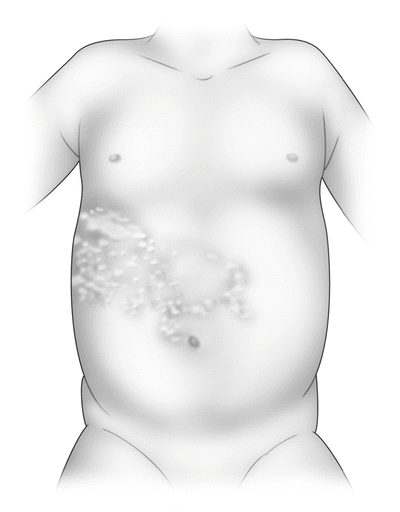, Toral Patel3, 4, Neill T. Peters3, 2 and Sarah Kasprowicz5
(1)
Northwestern University Feinberg School of Medicine, Chicago, IL, USA
(2)
Medical Dermatology Associates of Chicago, Chicago, IL, USA
(3)
Instructor of Clinical Dermatology, Northwestern University Feinberg School of Medicine, Chicago, IL, USA
(4)
D&A Dermatology, Chicago, IL, USA
(5)
NorthShore University HealthSystem, University of Chicago, Pritzker School of Medicine, Chicago, IL, USA
Keywords
UrticariaHivesAngioedemaVitamin DStress-reductionIntroduction
Urticaria, or hives, is a common condition with a lifetime prevalence of approximately 25% (Williams and Sharma 2015). Transient dermal red pruritic papules and plaques form due to the release of various mediators from mast cells. These mediators include both histamine and prostaglandins and cause increased vascular permeability leading to edema and lesion progression. Urticaria may be difficult to treat and can significantly impair quality of life. Angioedema is an acute swelling of the dermis and subcutaneous tissue or the mucosa and submucosal tissue. This rapid swelling can cause emergent airway obstruction and may warrant urgent care. Classification of urticaria is based on the duration of the episode. Urticaria of less than 6 weeks duration is considered acute while episodes persisting more than 6 weeks are classified as chronic.
The pathogenesis of urticaria is poorly understood. Potential triggers are identified in only 10–20% of cases. Triggers for urticaria are either allergic or non-allergic. Allergic triggers include medications and food substances. Non- allergic triggers include stress, infections (viral, bacterial, fungal, or parasitic) physical factors (pressure, water, sunlight, vibration, heat or cold), drugs (NSAIDS, opiates and many others), thyroid disease, and autoimmune disorders, making it difficult to pinpoint a cause.
Conventional treatments include antihistamines such as fexofenadine, cetirizine, diphenhydramine, and hydroxyzine, as well as more potent immunosuppressive agents such as prednisone and cyclosporine. In dapsone, colchicine and omalizumab, we find immunomodulatory agents that can be helpful in some cases (Greenberger 2014). Overall, there is no single agent or combination of agents that is curative. Treatment can be challenging and associated with side effects. Patients often pursue alternative treatments to prevent flares, reduce symptom severity, or prevent relapse once control is achieved. However, evidence validating the efficacy of these approaches is limited. For example, dietary modification, through supplementation or exclusion, is a popular treatment modality. Health care professionals should be aware of literature pertaining to nutrition and self-directed therapy that patients may turn to in an effort to control their urticaria.
Some alternative therapies that have been reported to provide adjunctive relief of urticaria include stress reduction via hypnosis or massage, Vitamin D supplementation, oral flavonoids, and dietary modification. Each of these modalities is discussed here.
Top Considerations
See Table 10.1.
Table 10.1.
Top considerations.
Treatment | How administered | Notes |
|---|---|---|
Vitamin D | 4,000 IU daily by mouth for 12 weeks | May improve urticaria independent of baseline serum vitamin D levels; generally safe and well-tolerated |
Stress-reduction | Hypnosis or meditation | May improve symptoms and quality of life |
Dietary modification | Avoidance of allergens and pseudoallergens | May benefit some patients; Difficult to confirm sensitivity to pseudoallergens and high-quality evidence lacking |
Stress Reduction
Many authors suggest that psychological stress can exacerbate urticaria; however, the exact mechanism by which this occurs is not well-understood (Spickett 2014 and Dave et al. 2011). The autonomic nervous system appears to suppress the production of IL-12 via catecholamines and corticoids which seems to play a role in regulatory function, thus fueling the potential for inflammation (Dave et al. 2011). While randomized controlled trials (RTC) are lacking, benefit has been observed and reported utilizing stress reduction techniques to improve urticaria, without the risks of medications. Stress reduction may also have other positive effects on the patient, making it a reasonable adjunctive approach for almost anyone.
Evidence for Stress Reduction










